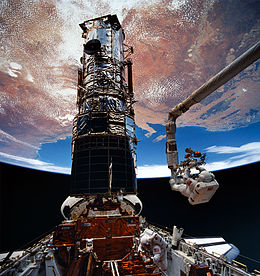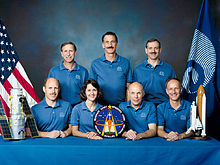STS-61

Astronauts work on Hubble in Endeavour's payload bay; Story Musgrave, anchored on the end of the Canadarm, prepares to be elevated to the top of the HST to install protective covers on the magnetometers
|
|
| Mission type | Hubble servicing |
|---|---|
| Operator | NASA |
| COSPAR ID | 1993-075A |
| SATCAT no. | 22917 |
| Mission duration | 10 days, 19 hours, 58 minutes, 37 seconds |
| Distance travelled | 4,433,772 miles (7,135,464 km) |
| Orbits completed | 163 |
| Spacecraft properties | |
| Spacecraft | Space Shuttle Endeavour |
| Landing mass | 94,972 kg (209,377 lb) |
| Payload mass | 10,949 kg (24,138 lb) |
| Crew | |
| Crew size | 7 |
| Members |
Richard O. Covey Kenneth D. Bowersox Kathryn C. Thornton Claude Nicollier Jeffrey A. Hoffman F. Story Musgrave Thomas D. Akers |
| Start of mission | |
| Launch date | 2 December 1993, 09:27:00 UTC |
| Launch site | Kennedy LC-39B |
| End of mission | |
| Landing date | 13 December 1993, 05:25:33 UTC |
| Landing site | Kennedy SLF Runway 33 |
| Orbital parameters | |
| Reference system | Geocentric |
| Regime | Low Earth |
| Perigee | 291 kilometres (181 mi) |
| Apogee | 576 kilometres (358 mi) |
| Inclination | 28.45 degrees |
| Period | 93.3 min |
| Capture of Hubble | |
| RMS capture | 4 December 1993, 08:48 UTC |
| Berthing date | 4 December 1993, 09:26 UTC |
| RMS release | 9 December 1993, 10:26 UTC |
 Left to right - Standing: Covey, Hoffman, Akers; Seated: Bowersox, Thornton, Musgrave, Nicollier |
|
STS-61 was the first Hubble Space Telescope servicing mission, and the fifth flight of the Space Shuttle Endeavour. The mission launched on 2 December 1993 from Kennedy Space Center in Florida. The mission restored the spaceborne observatory's vision, marred by spherical aberration, with the installation of a new main camera and a corrective optics package. This correction occurred more than three and a half years after the Hubble was launched aboard STS-31 in April 1990. The flight also brought instrument upgrades and new solar arrays to the telescope. With its very heavy workload, the STS-61 mission was one of the most complex in the Shuttle's history. It lasted almost 11 days, and crew members made five spacewalks (EVAs), an all-time record. Even the re-positioning of Intelsat VI on STS-49 in May 1992 required only four. The flight plan allowed for two additional EVAs, which could have raised the total number to seven. The final two contingency EVAs were not made. In order to complete the mission without too much fatigue, the five extravehicular working sessions were shared between two pairs of different astronauts alternating their shifts.
Endeavour was switched from Pad 39A to Pad 39B due to contamination of the Payload Changeout Room after a windstorm on October 30. The internal HST payload package was not affected because it was tightly sealed, and the contamination appeared to have been caused by sandblasting grit from recent Pad A modifications. On November 18 Endeavour experienced a failure of a transducer on the elevon hydraulic actuator. To replace the actuator would have required a rollback to the Orbiter Processing Facility (OPF) because access to the actuator was only through the Main Landing Gear wheel well. Since there were 4 delta-P transducers and the Launch Commit Criteria required only 3 of 4, the transducer was depinned and would not be consulted during flight. The flight crew arrived at the KSC Shuttle Landing Facility (SLF) on November 27 and the payload bay doors were closed at 3:20pm on November 28. The first launch attempt on December 1, 1993 was scrubbed due to weather constraint violations at the Shuttle Landing Facility. Just before the scrub the range was also in a no-go situation due to an 800 ft long ship in restricted sea zone. A 24‑hour scrub turn-a-round was put into effect with a launch window extending between 4:26am to 5:38am on December 2, 1993. Launch occurred .019 seconds from its scheduled time of 4:26am December 2, 1993. Launch mass was 250,314 lbs. Payload mass was 17,662 lbs. After launch on 2 December 1993, the astronauts carried out a series of checks on the vehicle and went to sleep seven and a half hours after liftoff.
...
Wikipedia

